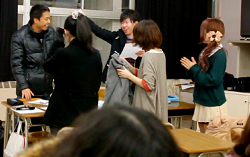Have you ever been on a winning team? How did it make you feel to be a participating team member? Did you have more fun playing the game with others than when you played the game alone? Did you become a better player by practicing with the other team members? Did the team become more successful when it helped individuals develop better skills? Have you ever noticed effective groups that achieve high-performance levels, like a championship baseball team, a rock band, a debate team, a school orchestra, or a product development team? What makes those groups successful?
Introduction
Have you ever been on a winning team? How did it make you feel to be a participating team member? Did you have more fun playing the game with others than when you played the game alone? Did you become a better player by practicing with the other team members? Did the team become more successful when it helped individuals develop better skills? Have you ever noticed effective groups that achieve high-performance levels, like a championship baseball team, a rock band, a debate team, a school orchestra, or a product development team? What makes those groups successful?
Making teams work
Questions like these are essential to consider when we try to understand the potential of teamwork in the classroom. Building an effective team requires that we not only understand group dynamics but also achieve individual and group goals, are satisfied with the process, and are willing to collaborate in future activities (Hackman, 1992). Therefore, critical questions for us to consider as we explore group dynamics include the following:
- Can we apply teamwork in the classroom to increase our learning and satisfaction at school?
- How can the teamwork skills we develop contribute to success outside of college?
Creating opportunities
We may find that shifting from the contemporary lecture-based classroom to a team-based learning strategy presents new opportunities and challenges for students and teachers. At the same time, applying group dynamics to learning can help us develop skills that translate into more success in school, work, community, and family (University of Phoenix, 2004; Fink, 2004; Imafuku, Kurata, Kataoka, & Mayahara, 2010). In addition, we may find what students worldwide already know: learning in teams can be much more fun than listening to lectures and preparing for tests.
Moving ahead
In this discussion, we will explore the fundamentals of group dynamics related to team learning strategy. Our objectives will be as follows:
- To understand how collaborative learning processes can enhance student performance and satisfaction.
- To differentiate between groups and teams.
- To understand the potential advantages and disadvantages of learning in a team.
- To understand group structure's role in building a successful learning team.




![Your brain can keep growing, adapting, and learning at any age, if you are willing to put in the effort [Image: Copilot]](/images/Images/best-years-for-adult-brain300.png)

